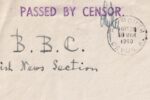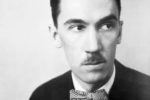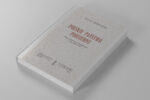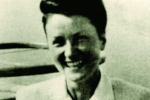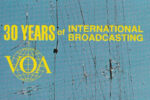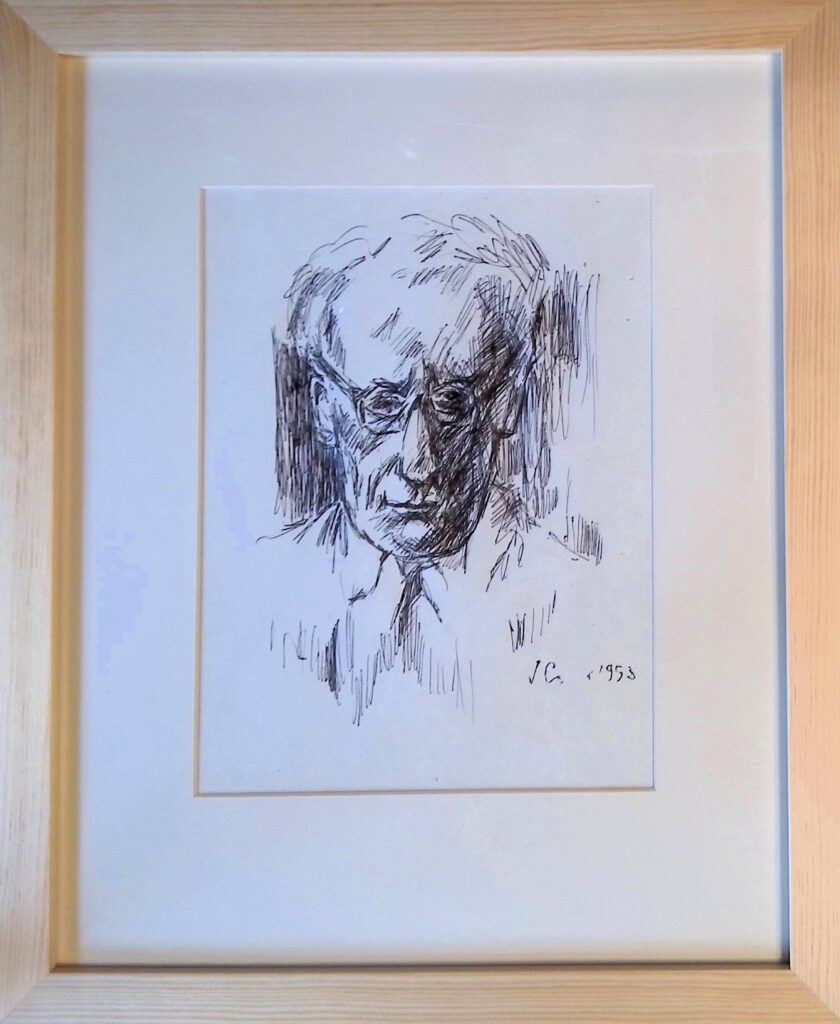
Józef Czapski (1896-1993) – “Autoportret-szkic, 1953 rok”.
Muzeum Radia Zimnej Wojny zakupiło autoportret-szkic Józefa Czapskiego z podpisem autora, 1953 rok. Trzy lata wcześniej, w roku 1950, Głos Ameryki ocenzurował pogadankę Czapskiego na temat zbrodni katyńskiej. Powodem cenzury w 1950 roku mogła być obawa o negatywną reakcję reżimu komunistycznego w Polsce i jego sowieckich mocodawców bądź również obawa dyrekcji amerykańskiej rozgłośni, że opis zbrodni na tysiącach polskich oficerów w niewoli sowieckiej mógłby doprowadzić do zamieszek w Polsce, które zostałyby krwawo stłumione. Innym powodem mogła być także obawa, że wspomnienia Czapskiego o jego bezskutecznych poszukiwaniach polskich oficerów, których zamordowano w Katyniu, spowodowałyby zwiększenie zagłuszania audycji Głosu Ameryki. Dyrekcja sekcji polskiej Głosu Ameryki pozwoliła Czapskiemu na nagranie tylko części przygotowanego przez niego tekstu. Ocenzurowanie wybitnego polskiego artysty i pisarza, który był więźniem w obozach sowieckich, wywołało głośne protesty w prasie amerykańskiej i w Kongresie Stanów Zjednoczonych. Józef Czapski był wstrząśnięty i oburzony zastosowaną przeciwko niemu cenzurą. W czasie drugiej wojny światowej Głos Ameryki podtrzymywał kłamstwo Stalina i propagandy sowieckiej, że odpowiedzialni za zbrodnię katyńską były hitlerowskie Niemcy. Przez wiele lat po wojnie, amerykańska dyrekcja Głosu Ameryki unikała nagłaśniania tematu zbrodni katyńskiej i od czasu do czasu cenzurowała wypowiedzi na ten temat, które wydawały się kierownictwu zbyt drastyczne. Działo się to w latach, kiedy Głos Ameryki wraz z sekcją polską znajdował się pod nadzorem dyplomatów Departamentu Stanu, a później dyplomatów Agencji Informacyjnej Stanów Zjednoczonych. Pełny koniec cenzurze o Katyniu położyła dopiero administracja Prezydenta Ronalda Reagana. Dopiero kiedy Tadeusz Lipień został szefem sekcji polskiej na początku lat 80, Głos Ameryki nadał wywiad z Józefem Czapskim bez żadnej cenzury.
The Cold War Radio Museum has acquired a self-portrait sketch by Józef Czapski, signed by the artist and dated 1953. Three years earlier, in 1950, the Voice of America censored Czapski’s talk on the Katyn crime. The reason for the censorship in 1950 may have been the fear of an adverse reaction from the communist regime in Poland and its Soviet principals, or the fear of the management of the American radio station that the description of the crimes against thousands of Polish officers in Soviet captivity could lead to riots in Poland, which would be bloodily suppressed. Another reason may have been the fear that Czapski’s memories of his unsuccessful search for Polish officers murdered in Katyn would lead to increased jamming of the Voice of America broadcasts. The management of the Polish section of the Voice of America allowed Czapski to record only part of the text he had prepared. The censorship of the outstanding Polish artist and writer, who had been a prisoner in Soviet camps, sparked loud protests in the American press and in the United States Congress. Józef Czapski was shocked and outraged by the censorship used against him. During World War II, the Voice of America supported the lie of Stalin and Soviet propaganda that Nazi Germany was responsible for the Katyn massacre. For many years after the war, the American management of the Voice of America avoided publicizing the subject of the Katyn massacre and, from time to time, censored statements on the subject that seemed too drastic to the management. This occurred during the years when the Voice of America, along with the Polish section, was overseen by diplomats from the State Department and later the United States Information Agency. The administration of President Ronald Reagan ordered the complete end of censorship of the Katyn story at the Voice of America. It was not until Tadeusz Lipień became head of the Polish section in the early 1980s that the Voice of America broadcast an interview with Józef Czapski without any censorship.
